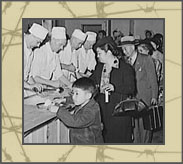| |
Life in the Camp
 Eating a meal at the camp was similar to eating at a large school cafeteria. Photo Credit: Library of Congress.
Eating a meal at the camp was similar to eating at a large school cafeteria. Photo Credit: Library of Congress. |
Heart Mountain was the largest of the relocation camps, with about 10,000 people living there. We lived in barracks, and each family had a room about 15 wide by 20 five feet long. This would house a family of anywhere from four to seven people. This was your living room and bedroom. Each one had a potbelly stove for warmth, one light, and an army cot for each person. Everything was right in this one room. I would say that the length was alright, but width-wise, it was a little narrow. Because our living space was so small, we were closely supervised as kids.
To use the bathroom, we went to the shared latrines.
To eat, we went to the mess hall.
We ate as a family, but not in our room. We had meal tickets that corresponded to a mess hall - the yellow mess, the red mess, or the blue mess - and you would come through the line and the mess steward would punch your ticket for breakfast, lunch, or dinner.
We also had a governmental structure in camp where each block would have a block council, and the block council would then elect a block manager. My dad was block manager.
We had some flare-ups in Heart Mountain, but nothing like the riot. Once a rock was thrown through our barrack's window. This was because some people did not agree with my family's beliefs. My brother-in-law was very active in the Japanese American Citizen's League (JACL). JACL decided in the beginning of the war to cooperate with the U.S. government because that would prove our American patriotism. JACL was going to cooperate fully with the authorities in making sure that the relocation went off as smoothly as possible. Other Japanese Americans did not believe that we should cooperate with the American government because the camps were unconstitutional, and they knew that my brother-in-law was the executive director of the JACL. I think it was those people who objected to the JACL's position who threw the rocks and broke two of our windows.
Think About It
What do you think would be hardest about living in the camps from day to day?

|
|

